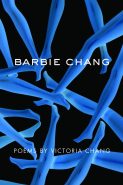
Review: Barbie Chang by Victoria Chang
Reviewed by Kitty Anarchy

Barbie Chang
Poetry by Victoria Chang
Copper Canyon Press (November, 2017)
$12.80, 96 pp.
ISBN-13: 978-1556595165
Victoria Chang’s poetry collection Barbie Chang looks at the complex realities of racism for third-generation children. Even as a child, the speaker, Barbie Chang, is not able to have normal friendships with anyone—she overhears a classmate’s mother advising her daughter against forging a friendship with her because it is not in her best interest in “Barbie Chang’s Daughter:” “the new girl’s / mom tells Barbie Chang / that her own daughter should not tie / herself down too fast.”
The speaker foreshadows her future endeavors as she curiously observes the Circles, reminiscent of the Plastics in Mean Girls: flawless, shiny manicured, gorgeous people with certain size and fashion requirements (in “Barbie Chang Got Her Hair Done,” they have “matching floral / barrettes”), mannerisms, and etiquette. Barbie Chang and outsiders are intrigued by the seemingly perfect lifestyle the Circles exude, those intricacies she craves to belong to. In “Barbie Chang Loves Evites” she “sipped water for days,” reminiscent of the diet advice to drink a glass of water when you’re hungry.
Chang’s poems raise many questions. Why do women chase after these groups that usually are based on superficial looks? Why are women willing to change in order to be accepted instead of accepting themselves and having accepting people in their lives? In “Barbie Chang Shakes,” she writes,
Barbie Chang shakes the hand of
another Smith a former
beauty queen who still wins friends
at school sets the
rules for who is cool and who is not.
Attractiveness is still the factor that gets someone friends, and, let’s face it, the beautiful people get more benefits through life.
Why do they do it all? Approval. In “Barbie Chang Runs” “there’s always a woman / worrying about other / women wanting to be loved by other women,” forever chasing and seeking approval from those who should be allies, sisters. This poem illustrates the craving for acceptance that is often conditional on outward appearance. Women also get caught up in the competition for an unachievable perfect life. In “There are Lungs,” she illustrates this idea,
Barbie Chang is still
working harder because
the women at school seem better and
healthier have better
breath and time and rhyme when they speak
some of them pretend to be wealthy
if they pretend then
why does she want a new house bigger
than theirs
We, along with Barbie Chang are longing to be better, although we all know it’s pretend.
There are additional themes in this collection that cause the reader to self-reflect on feminist identity. In “Is A Windcatcher” the speaker comments on the value that society, particularly men, place on women: “is Barbie Chang still a / woman if she does not look in the mirror / does she exist if she walks past men / and they do not look.” In “Once Barbie Chang Loved,” “she is always thirsty always / looking for someone / else to make her worthy.” Readers can connect with Barbie Chang through her vulnerability and honesty, as this reviewer felt some of the things that this collection addresses, such as wanting to fit in with the beautiful clique, wanting the stamp of approval from others.
This collection speaks for those who have struggled with not meeting expectations or standards and have felt on the outside looking in. Reflecting on leaving that world behind, the speaker remembers in “Once Barbie Chang Worked,” “once she sprinkled her yard / with timed water once.” Some things just are not worth the time and energy, no matter how good they tell you it looks.
Kitty Anarchy is an anarchafeminist, chicana womyn poet and short story writer. She has a background in social work having earned her MSW from California State University, Long Beach. She has 7 cats, her favorite being ChiChi and 2 dogs named Bandit and Nibbit. She is published in Rabid Oak online literary journal.

[…] by Kitty Anarchy From: Los Angeles Review […]